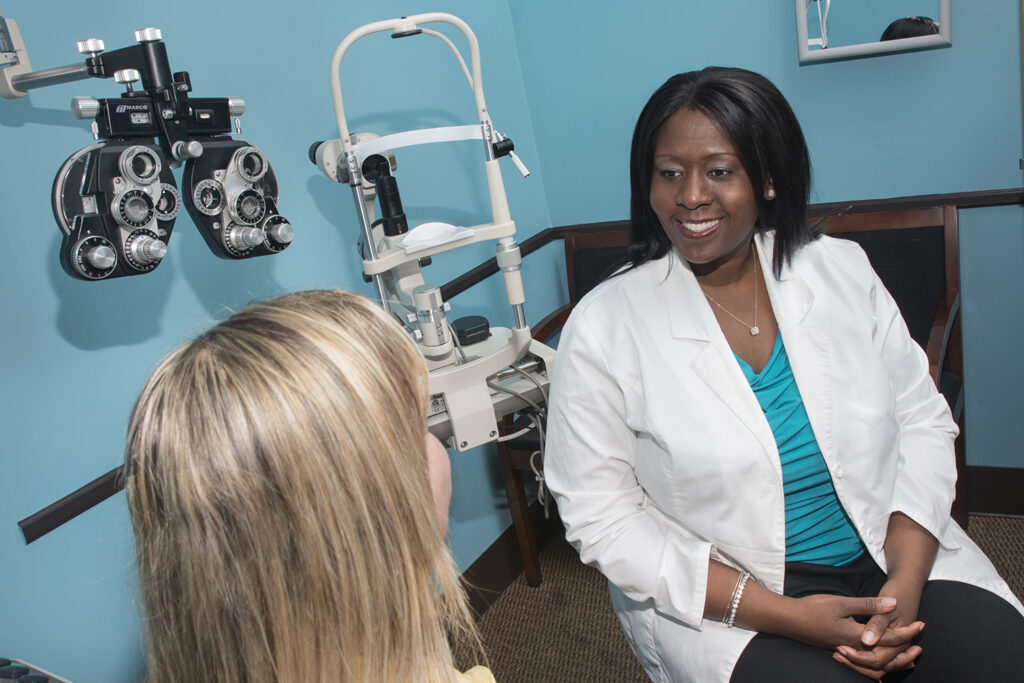National Eye Exam Month

Protecting Your Vision for a Lifetime
August is National Eye Exam Month, a time to emphasize the importance of regular eye exams in maintaining eye health and preventing vision problems. For women optometrists and their patients, this month serves as a crucial reminder of the proactive steps we can take to safeguard our vision. Let’s explore why regular eye exams are essential, the benefits they offer, and inspiring examples that highlight their importance.
The Importance of Regular Eye Exams
Eye exams are not just about checking vision; they are comprehensive health checks that can detect a range of issues early, from common vision problems to serious eye diseases.
Detecting Eye Diseases Early: Regular eye exams can identify conditions such as glaucoma, macular degeneration, and cataracts in their early stages, often before symptoms appear. Early detection is key to managing these conditions and preventing vision loss.
Overall Health Indicator: Eye exams can also reveal signs of systemic diseases such as diabetes, hypertension, and high cholesterol. The eyes provide a unique window into our overall health, making regular exams a critical component of preventative healthcare.
Benefits of Regular Eye Exams
1. Improved Quality of Life: Regular eye exams ensure that vision correction is up-to-date, enhancing daily activities and overall quality of life. Clear vision is essential for reading, driving, working, and enjoying hobbies.
Inspirational Example: Sarah, a busy mother and professional, struggled with frequent headaches and eye strain. A comprehensive eye exam revealed that her prescription needed updating. With new glasses, her headaches disappeared, and she found herself more productive and less fatigued. Sarah’s story highlights how regular eye exams can significantly improve daily life.
2. Preventing Vision Loss: Eye diseases like glaucoma and macular degeneration can progress without noticeable symptoms. Regular eye exams allow for early intervention, which can slow or prevent vision loss.
Psychological Insight: The fear of vision loss can cause anxiety and stress. According to the American Psychological Association, addressing health concerns proactively can reduce these negative emotions and promote a sense of control and well-being.
3. Enhancing Academic and Work Performance: Good vision is crucial for learning and professional performance. Undiagnosed vision problems can lead to difficulties in school or work, impacting productivity and success.
Example: Consider the case of John, a high school student whose grades were slipping. A routine eye exam uncovered that he had difficulty seeing the board and reading textbooks. With corrective lenses, John’s academic performance improved, and his confidence soared. Regular eye exams can ensure that students and professionals perform at their best.
National Eye Exam Month: Taking Action
1. Schedule Your Exam: Make it a priority to schedule an eye exam for yourself and your family members. Encourage others to do the same by sharing the importance of regular eye care.
2. Educate and Advocate: Use this month to educate your community about the benefits of regular eye exams. Host informational sessions, share educational materials, and utilize social media to spread awareness.
3. Promote Comprehensive Eye Care: Encourage patients to view eye exams as part of their overall health routine. Discuss the connection between eye health and systemic health during appointments to emphasize the broader benefits of regular eye care.
The Role of Women Optometrists
As women optometrists, you play a pivotal role in promoting eye health and preventive care. Your expertise and advocacy can make a significant difference in your patients’ lives.
Empowering Patients: Provide clear, understandable information about the importance of regular eye exams. Empower your patients to take charge of their eye health by making informed decisions.
Building Trust: Develop strong, trusting relationships with your patients. When patients feel comfortable and confident in their care, they are more likely to adhere to recommendations for regular eye exams.
Community Outreach: Engage in community outreach programs to raise awareness about eye health. Offer free screenings or educational workshops to reach underserved populations who may not have regular access to eye care.
Conclusion
National Eye Exam Month is an opportunity to highlight the critical importance of regular eye exams in maintaining eye health and preventing vision problems. By understanding the benefits and taking proactive steps, we can protect our vision and enhance our quality of life.
For women optometrists, this month is a chance to lead by example, educate your communities, and advocate for comprehensive eye care. Let’s use National Eye Exam Month to inspire action, promote eye health, and ensure a brighter, clearer future for everyone. Schedule your eye exam today and encourage others to do the same—your vision is worth it.






Responses